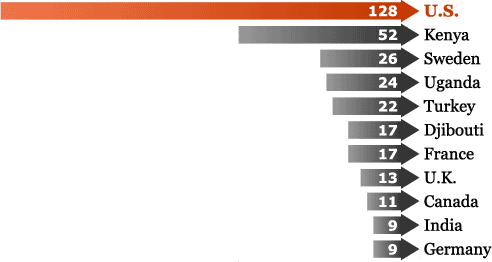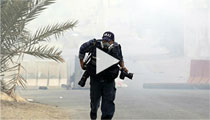The Obama administration continued to clamp down on officials who leak sensitive information to the news media. A former CIA officer pleaded guilty to criminal charges of leaking a covert operative’s identity, effectively ending a legal battle by three journalists fighting government subpoenas to testify in the case. The director of national intelligence announced new rules to clamp down on leaks, and the Senate debated a bill that would further impede officials from sharing intelligence information with the press. In issues related to access, a military judge rejected a request by several media outlets to broadcast the Guantánamo Bay trial of suspects accused in the 2000 attack on the USS Cole. And a number of news organizations appealed a military judicial decision to seal documents related to the court-martial of Army Pvt. Bradley Manning, who faced charges of leaking classified documents to WikiLeaks. Reporter James Risen, author Ed Moloney, and documentary filmmaker Ken Burns continued to fight subpoenas that would force them to turn over their unpublished reporting or testify in criminal investigations. Several journalists were arrested covering demonstrations linked to the Occupy movement.
United States
» Government cracks down on officials leaking sensitive information.
» Media are denied access, documents in military trials.
The Obama administration continued to clamp down on officials who leak sensitive information to the news media. A former CIA officer pleaded guilty to criminal charges of leaking a covert operative’s identity, effectively ending a legal battle by three journalists fighting government subpoenas to testify in the case. The director of national intelligence announced new rules to clamp down on leaks, and the Senate debated a bill that would further impede officials from sharing intelligence information with the press. In issues related to access, a military judge rejected a request by several media outlets to broadcast the Guantánamo Bay trial of suspects accused in the 2000 attack on the USS Cole. And a number of news organizations appealed a military judicial decision to seal documents related to the court-martial of Army Pvt. Bradley Manning, who faced charges of leaking classified documents to WikiLeaks. Reporter James Risen, author Ed Moloney, and documentary filmmaker Ken Burns continued to fight subpoenas that would force them to turn over their unpublished reporting or testify in criminal investigations. Several journalists were arrested covering demonstrations linked to the Occupy movement.
At least six journalists were detained after they were caught up in the mass arrests of protesters during an Occupy demonstration in Oakland, California, in January. Disputes over proper press accreditation were at the center of the detentions.
3
Journalists had press credentials, but not police-issued accreditation.2
Journalists had press passes issued by San Francisco, but not Oakland, police.1
Journalist had an expired police-issued pass.Since 2009, the Obama administration has prosecuted six leak-related cases, twice as many as under all previous presidents combined, according to The New York Times. All branches of government sought to clamp down on information leaked to the press in 2012.
2.5
Years in prison for former CIA officer who leaked the identity of a covert operative to a reporter.80,000
Pages of documents generated by the Food and Drug Administration in an effort to halt leaks by secretly monitoring the email of its own scientists.1
New set of guidelines, including lie detector tests, introduced to prevent leaks by intelligence officers.A U.S. District Court judge in San Francisco ordered the FBI to pay $479,459 in attorney fees incurred by journalist Seth Rosenfeld in connection with his pursuit of public documents, according to the Reporters Committee for Freedom of the Press. Rosenfeld sought information on the 1960s protest movements based in Berkeley, California, and the relationship between the FBI and President Ronald Reagan. He ultimately filed lawsuits to extract the information, which had long been delayed.
2
Lawsuits filed by Rosenfeld against the FBI27
Years since first suit was filed300,000
Pages of documents requested by RosenfeldThe United States hosts the most exiled journalists in the world, according to CPJ research. Although these journalists find safety in exile, only about one in five is able to resume work in the profession.


